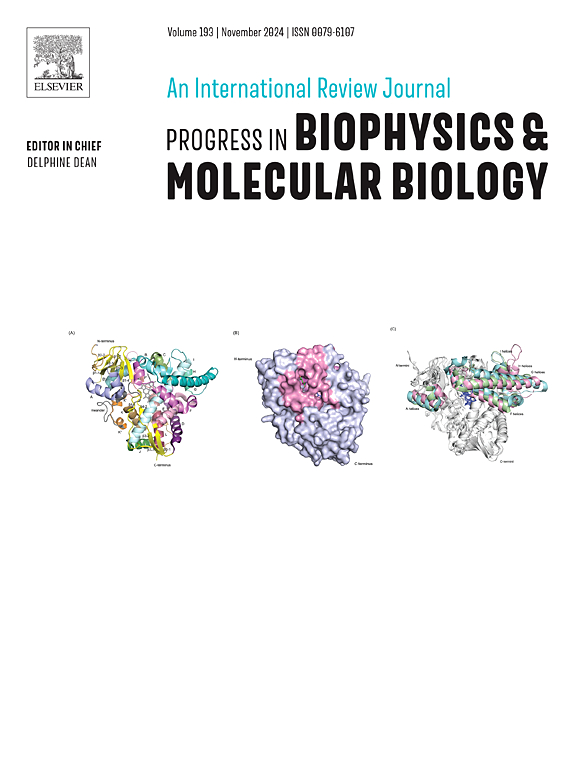Roles of gastric cancer-derived exosomes in the occurrence of metastatic hepatocellular carcinoma
IF 4.5
3区 生物学
Q2 BIOCHEMISTRY & MOLECULAR BIOLOGY
Progress in Biophysics & Molecular Biology
Pub Date : 2025-01-28
DOI:10.1016/j.pbiomolbio.2025.01.005
引用次数: 0
Abstract
Gastric cancer (GC), particularly in East Asia, is among the most prevalent cancers with high mortality rates. According to recent epidemiological data, patients with GC account for over a quarter of all cancer incidences and approximately one third of cancer-related deaths in East Asia. Liver metastasis (LM) is not only a common form of GC distant metastasis but also poses a major challenge to the prognosis and treatment of patients with advanced GC. Increasing evidence has shown that the gut-liver axis plays a pivotal role in maintaining the stomach-liver-gut homeostasis. Exosomes are small secreted vesicles enriched with specific proteins, lipids, and nucleic acids. These vesicles exhibit significant activities in signal transmission to adjacent or distant cells in the gut-liver axis, as well as in remodeling the tumor microenvironment. Some research have pointed out that exosomes promote LM of various cancers. However, there still lack of complete and systematic review on how exosomes affect GC-LM. In this article, we present a comprehensive description to explore the role of GC-derived exosomes in the occurrence and development of metastatic hepatocellular carcinoma (HCC).
胃癌来源外泌体在转移性肝细胞癌发生中的作用。
胃癌(GC),特别是在东亚,是死亡率最高的常见癌症之一。根据最近的流行病学数据,胃癌患者占东亚所有癌症发病率的四分之一以上,约占癌症相关死亡的三分之一。肝转移(LM)是胃癌的一种常见的远处转移形式,也是晚期胃癌患者预后和治疗的主要挑战。越来越多的证据表明,肠-肝轴在维持胃-肝-肠稳态中起着关键作用。外泌体是小的分泌囊泡,富含特定的蛋白质、脂质和核酸。这些囊泡在肠-肝轴向邻近或远处细胞的信号传递以及肿瘤微环境的重塑中表现出显著的活性。一些研究指出外泌体促进多种癌症的癌变。然而,外泌体对GC-LM的影响尚缺乏完整、系统的研究。在这篇文章中,我们全面描述了gc来源的外泌体在转移性肝细胞癌(HCC)的发生和发展中的作用。
本文章由计算机程序翻译,如有差异,请以英文原文为准。
求助全文
约1分钟内获得全文
求助全文
来源期刊

Progress in Biophysics & Molecular Biology
生物-生化与分子生物学
CiteScore
8.60
自引率
7.90%
发文量
85
审稿时长
85 days
期刊介绍:
Progress in Biophysics & Molecular Biology is an international review journal and covers the ground between the physical and biological sciences since its launch in 1950. It indicates to the physicist the great variety of unsolved problems awaiting attention in biology and medicine. The biologist and biochemist will find that this journal presents new and stimulating ideas and novel approaches to studying and influencing structural and functional properties of the living organism. This journal will be of particular interest to biophysicists, biologists, biochemists, cell physiologists, systems biologists, and molecular biologists.
 求助内容:
求助内容: 应助结果提醒方式:
应助结果提醒方式:


